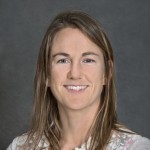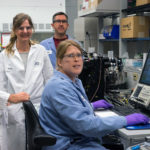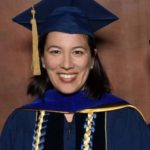Two scientists from the Biosciences Area, Sung-Hou Kim and Susannah Tringe, have been named Fellows of the American Association for the Advancement of Science (AAAS). They join fellow Lab scientists Allen Goldsten, faculty scientist in the Energy Technologies Area, and Kathy Yelick, associate laboratory director of Computing Sciences, in receiving the distinction of Fellow this year for “their scientifically or socially distinguished efforts to advance science or its applications.”
JGI’s CIO Part of Winning SC18 Team
On November 15, 2018, at the International Conference for High Performance Computing, Networking, Storage and Analysis (SC18) Conference, teams led by Lawrence Berkeley National Laboratory (Berkeley Lab) and Oak Ridge National Laboratory (ORNL), respectively, shared the 2018 ACM Gordon Bell Prize.
Congratulations to JGI’s Chief Informatics Officer Kjiersten Fagnan, who was part of the ORNL-led, seven-member team. The 12-member Berkeley Lab team was recognized for training a deep neural network to identify extreme weather patterns from high-resolution climate simulations using high-performance computers.
Read the full story on the JGI website.
JGI Finds Novel Giant Viruses in Forest Soils
In Nature Communications, giant virus genomes have been discovered for the first time in a forest soil ecosystem by researchers from the JGI and the University of Massachusetts-Amherst (UMass Amherst). The giant virus genomes were discovered by JGI research scientist Frederik Schulz while helping Lauren Alteio, a UMass Amherst graduate student in Jeff Blanchard’s lab, analyze her metagenomic data. JGI researchers used a “mini-metagenomics” approach to reduce the complexity of the soil microbial communities, uncovering 15 novel giant virus genomes.
“Soils have been an overlooked ecosystem for giant virus diversity, with studies mostly focused on aquatic environments. The unbinned metagenome soil data suggests that the extent of giant virus diversity in Harvard forest soil is much higher than the 16 genomes recovered in this study, but accessing the genomes with traditional approaches is challenging,” said JGI Microbial Program head and study senior author Tanja Woyke. Click here to learn more on the JGI website.
JGI Helps Compare Truffle-Forming Fungi
Truffles are the fruiting bodies of the ectomycorrhizal (ECM) fungal symbionts residing on host plant roots, they play an important role in soil ecosystem services. In many Ascomycota and Basidiomycota lineages, truffle-forming species have evolved independently in nearly every major group. This suggests that symbiosis drives evolution of truffle diversity and selects for specific traits. An international team including JGI researchers sought insights into the ECM lifestyle of truffle-forming species. As reported in Nature Ecology & Evolution, the team conducted a comparative analysis of eight Pezizomycete fungi, including four species prized as delicacies.
Through the JGI’s Community Science Program, JGI de novo sequenced the genomes of two truffle-forming fungi: the Pig truffle (Choiromyces venosus) and, the Desert truffle (Terfezia boudieri) as well as of two other Pezizomycetes not forming truffles: Ascobolus immersus and Morchella importuna. These four genomes as well as the genome of the Piedmont white truffle (Tuber magnatum) were annotated through the JGI’s pipeline. The genome of the Burgundy Truffle (T. aestivum) was sequenced by Genoscope. Click to learn more on the JGI website.
Postdoc Investigates Interactions Between Soil Microbes and Plants
Lauren Jabusch has been passionate about sustainability and outreach since her early days as a freshman at UC Davis. Nearly a decade later, she has earned a bachelor’s, a master’s, and most recently a doctoral degree in biosystems engineering. Now a postdoctoral researcher at Berkeley Lab, Jabusch investigates the interactions between soil microbes and plants. She was recently profiled by her Alma Mater, UC Davis College of Engineering.
- « Previous Page
- 1
- …
- 25
- 26
- 27
- 28
- 29
- …
- 46
- Next Page »
Was this page useful?








